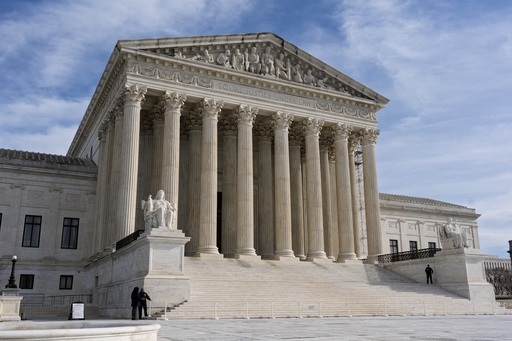
WASHINGTON — The respect for judicial decisions by President Donald Trump has been inconsistent. When the Supreme Court ruled in his favor about a year ago, allowing his name to appear on the ballot in Colorado, he regarded it as a “BIG WIN FOR AMERICA.” However, he has been vocal in opposing federal judges who have blocked some of his controversial initiatives, such as attempts to curtail federal spending. Recently, Vice President JD Vance argued that judges should not have the authority to limit the executive branch’s legal powers. Furthermore, billionaire Elon Musk expressed his outrage over a judge’s ruling that temporarily restricted his Department of Government Efficiency from accessing certain Treasury records, calling for impeachment against the judge he accused of protecting corruption. Musk’s response highlighted the contentious relationship between the judicial system and the executive branch under Trump’s leadership.
In a recent statement from the Oval Office, Trump indicated his intentions to respect court decisions. However, his actions suggest he is testing the limits of the interaction between the executive and judicial branches of government. This situation could lead to a significant examination of the landmark case Marbury v. Madison, where the Supreme Court established that courts serve as the ultimate arbiters of the law.
So, where did this all begin? The foundational principle was first articulated by Chief Justice John Marshall in the 1803 Marbury v. Madison case, which established that while Congress creates laws and the president enforces them, the courts determine when either branch oversteps its authority. Marshall famously stated, “It is emphatically the province and duty of the judicial department to say what the law is.” This idea also traces back to England, where courts gained a degree of independence from the monarchy. Saikrishna Prakash, a law professor at the University of Virginia, remarked that the Constitution implies the president must enforce judicial rulings, emphasizing that the separation of judicial and executive powers loses meaning if the executive can ignore court decisions.
Is the court indeed supreme? Justice Robert Jackson articulated that the authority of the court stems from its final say in legal disputes. He famously stated, “We are not final because we are infallible, but we are infallible only because we are final.” However, the court does not possess independent mechanisms to enforce its rulings; instead, it relies on other branches of government to implement its decisions. This dependency was starkly displayed in 1954, following the Supreme Court’s decision to end segregation in public education in Brown v. Board of Education, as Southern states resisted compliance for many years.
Despite occasional dissent, there exists a general belief among Americans that court rulings should be honored. Retired Justice Stephen Breyer has pointed to the contentious case Bush v. Gore, where the Supreme Court effectively awarded George W. Bush the presidency. Al Gore publicly accepted the decision on national television despite strongly opposing it. Similarly, President Bush dealt with unfavorable court rulings regarding the treatment of detainees during the “war on terror” and accepted those decisions, underscoring a collective understanding that following judicial rulings has become an ingrained American practice.
What recourse is available to Trump if he disagrees with a court ruling? JD Vance has claimed that judges should not constrain presidential authority, and while he is a well-educated lawyer, the legitimacy of the president’s actions remains a pivotal question. The Supreme Court curtailed President Joe Biden’s significant student loan forgiveness program, an outcome that Vance supported. When faced with unfavorable rulings, presidents can explore new legal avenues or attempt to legislate changes. During Bush’s presidency, for instance, each time a court raised concerns about his administration’s detention procedures, Congress enacted new laws. Biden’s efforts for alternative loan relief faced similar setbacks.
The current Roberts Court has also faced criticism from Trump’s supporters due to lower court judges halting several of his directives on spending and financial benefits for federal workers. Chief Justice John Roberts has voiced his concerns regarding judicial independence being compromised by threats and defiance towards judges. In his annual report, he condemned such actions, stating that they are wholly unacceptable and detrimental to the Republic. Some progressive commentators express anxiety that Roberts’ ruling, which grants presidents substantial immunity for official acts, may encourage Trump to defy judicial orders.
Ultimately, the principles established by Marshall in 1803 reinforce the belief that the U.S. operates under the rule of law rather than individual interests. As Georgetown law professor Brad Snyder puts it, preserving this tradition is critical for the future of governance in the nation.

